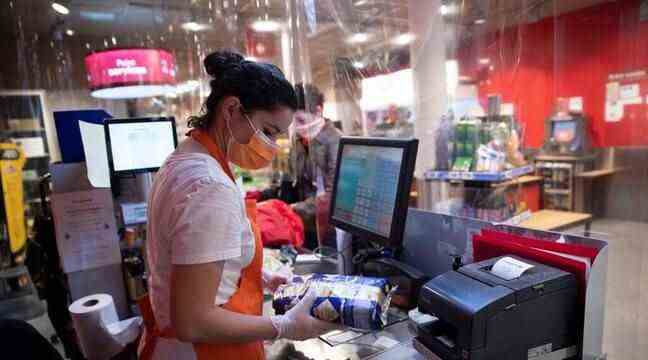“Even caregivers are being insulted at the moment. If doctors haven’t earned people’s respect during Covid-19, we’re not going to have it, don’t dream,” mutters Catherine* into her mask, shrugging her shoulders. The cashier of this Parisian Auchan is one of the “essential workers” of the health crisis, sent to the field during the first confinement between March and May 2020. A period when the forties “almost had the naivety to believe that we would be better considered. But it was stupid to hope. “Two years later, four other waves of Covid, thousands of receipts and barcodes scanned later, the conclusion is bitter: “Nothing has changed. No increase in wages, no consideration – neither of the bosses nor of society –, no improvement in working conditions”.
A stagnation at the origin of the march of essential workers this Thursday in Paris, organized by the CFDT. The union is indignant at “23 months of employer promises for so few results” in these second-line sectors. Véronique Revillod, deputy secretary general of the federation of services, entry attack on salaries: “Compensation has not changed, apart from
minimum wage automatically. And again, the salary grids that came into force in January 2022 are based on the minimum wage of… January 2021, while it increased twice during the year! »
Dead calm on wages
Economist Christine Erhel, professor at the National Conservatory of Arts and Crafts, indicates that in 2019, 44% of cashiers said they were dissatisfied with their remuneration and 16.9% were considered working poor. At the time, “the average gross hourly wage for cashiers and cashiers was 12.8 euros, against 20.7 for the average employee”, recalls the expert, who shares the observation of a lack of increases notables in the sector, despite a few bonuses here and there.
Bonuses which can hardly make us forget the precarious conditions of the profession, but also the situation during the first confinement: “We tend to forget it, but in March 2020, the cashiers worked without glass, without masks, without gel, with customers not hidden either. They went to work with fear in their stomachs, ”recalls Philippe Alonzo, lecturer in sociology at the University of Nantes and specialist in this profession.
“Respect died along with my career development dreams”
It is 5 p.m. in this Carrefour Market on the outskirts of Paris, off-peak time before the evening shopping. “It’s as little dynamic as my career,” says Maud* ironically. “Since Covid-19, people have been tense, and we are the ones who have suffered insults, contempt and unreasonable expectations. Some customers, if you don’t scan their PQ roll in less than five tenths of a second, you feel like they’re going to have a stroke.”
At the other end of the line, Véronique Revillod confirms “a flagrant increase in incivility over the past two years, with disproportionately impatient or demanding customers. “Same observation with Catherine, busy tidying up the store: “I had never received physical threats before the coronavirus. Since then, it happens several times a quarter, for a request to wear a mask, a forgotten article promotion or a checkout that is too slow for the customer’s taste. With humor still scathing, Maud concludes: “Respect died at the same time as my dreams of career development. »
No future
The lack of progression in careers and professional requalifications is the other black spot denounced by the CFDT. This lack of development is not without economic impact: “Essential workers start their career with a salary 5% lower than the average salary observed among 18-24 year olds at the start of their career. At the end of the career, this gap is 37%, proof of the stagnation of this profession”, figures Véronique Revillod.
But the constraints do not stop there. “Nobody wants to spend their life behind the cash register. However, we are never trained in anything else ”, declaims Inès, 29 years old *, resident in Brest (Finistère). Her career path is altogether classic in the profession: after a narrowly successful baccalaureate and two narrowly missed licenses, she finds herself working at Leclerc, “just to be able to fill the fridge”. But what was supposed to be a temporary job seems to be going on forever: “There’s better on a CV to apply elsewhere than a cashier. One is unemployable in the eyes of other professions. »
Last of the Mohicans
“By entrusting the most complex tasks to the machine, we have dispossessed, deskilled the work of the cashiers, who have increasingly taken on handling tasks and providing physical work. The role of host and connection has never intervened, ”supports Philippe Alonzo.
However, reskilling and offering other opportunities to cashiers seems more essential than ever, according to Véronique Revillod: “The profession is more or less bound to disappear. What will happen to cashiers if we don’t better support them towards other alternatives? At Maud, anger gives way to concern: “We know that we are the last of the Mohicans and we watch our job being replaced by automatic checkouts without saying a word. What can we do ? »
“We do not put 270,000 people out of work like that”, reassures the sociologist, recalling moreover that the automatic checkouts, present in half of the large distribution in France, are used by less than 20% of the customers, proof the sustainability of the profession according to him. Christine Erhel indicates that the profession is not in great difficulty in recruiting, “even if job rotation is high and the working conditions are restrictive”. Small consolation for Ines, who wonders jaded: “You, the others, did you really think at one point that we would be the heroes of confinement and the beneficiaries of the health crisis? We are the pigeons, that’s all. It is our eternal role, we must believe. »
*Names changed

